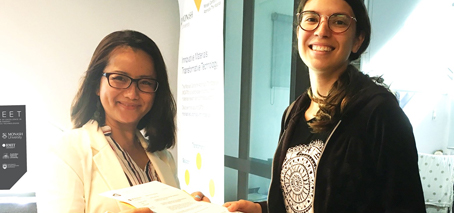“I love working in FLEET because it challenges me all the time, and because it has deepened my understanding in an essential topic to the progress of technology. I thought I would never be capable to work in an environment full of such brilliant minds.”
Jessica Alves at Monash University Engineering is the recipient of FLEET’s first Women in FLEET honours Scholarship, so we asked her a few questions about her research project with FLEET.
What have been your scientific highlights working within FLEET? “A 2D metal-organic framework (copper-dicyanobenzene) was proved to present topological non-trivial properties through first-principle calculations. It presents metallic edge-states and a gap opening through the mechanism of spin-orbit coupling as well as a non-trivial topological invariant.”
“I used computational resources and first-principles calculations to identify a 2D material that is a topological insulator, which means, it has a insulating inner but conducting edges. The advantage of this kind of materials is the ability to make not only smaller devices (since the material is only one atomic layer thick) but also decrease the demand of energy, since the conduction on this type of material is exceptional. The material was successfully predicted and the next step is to produce it in laboratory and confirm the predictions.”
Jessica was an honours student with FLEET’s Nikhil Medhekar, whose team performs quantum-mechanical simulations to investigate the electronic structure of atomically-thin topological insulators and interfaces in FLEET’s Research Theme 1.
How about highlights ‘outside’ of science? “The team-work and the help provided from FLEET members.”
What do you think are highlights for FLEET as a Centre so far? “Device fabrication through deposition of liquid metal, the application of low-dimensional materials in computing, and the discovery of applications of topological, atomically-thin materials that could reduce energy use in electronic devices.”
What’s next? “A PhD! I will be continuing my work in related to electronic technologies as a PhD student at QUT, under the supervision of Christopher Barner-Kowollik and James Blinco. My project there involves the development of a new ‘photoresist’ in the laboratory — a photoresist is a material that changes its resistivity according to the light it is exposed to. It is fundamental for the fabrication of microcircuits. The idea is to produce a polymeric photoresist with such properties that it would allow writing in smaller features than is currently possible, through activating or deactivating its molecules with laser (a methodology similar to STED microscopy).”
Women in FLEET scholarships are one of the Centre’s contributions to increasing the number of women in science. Scholarships are typically nominated by their supervisor. Read more about equity and fairness at FLEET, and other FLEET scholarships.

